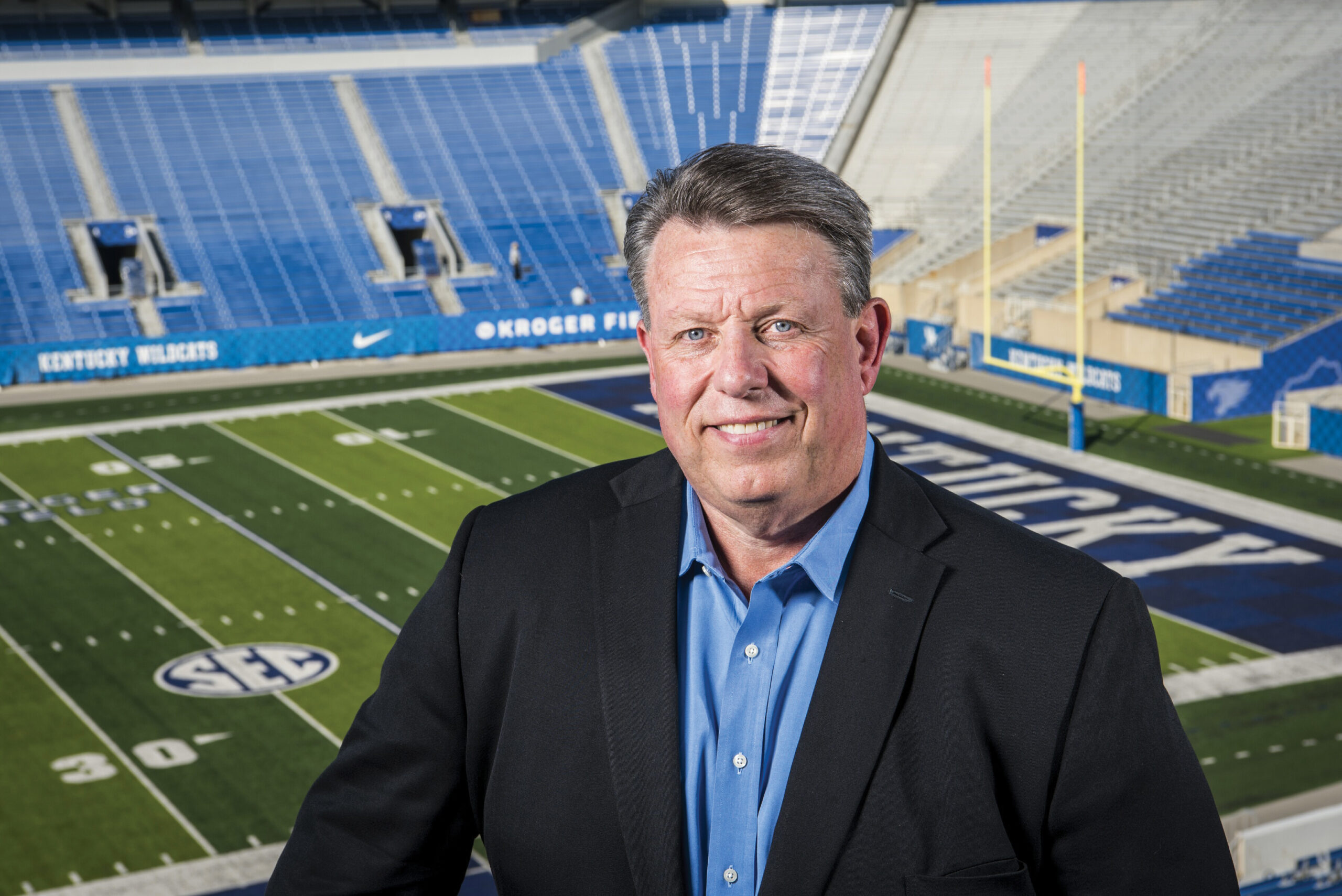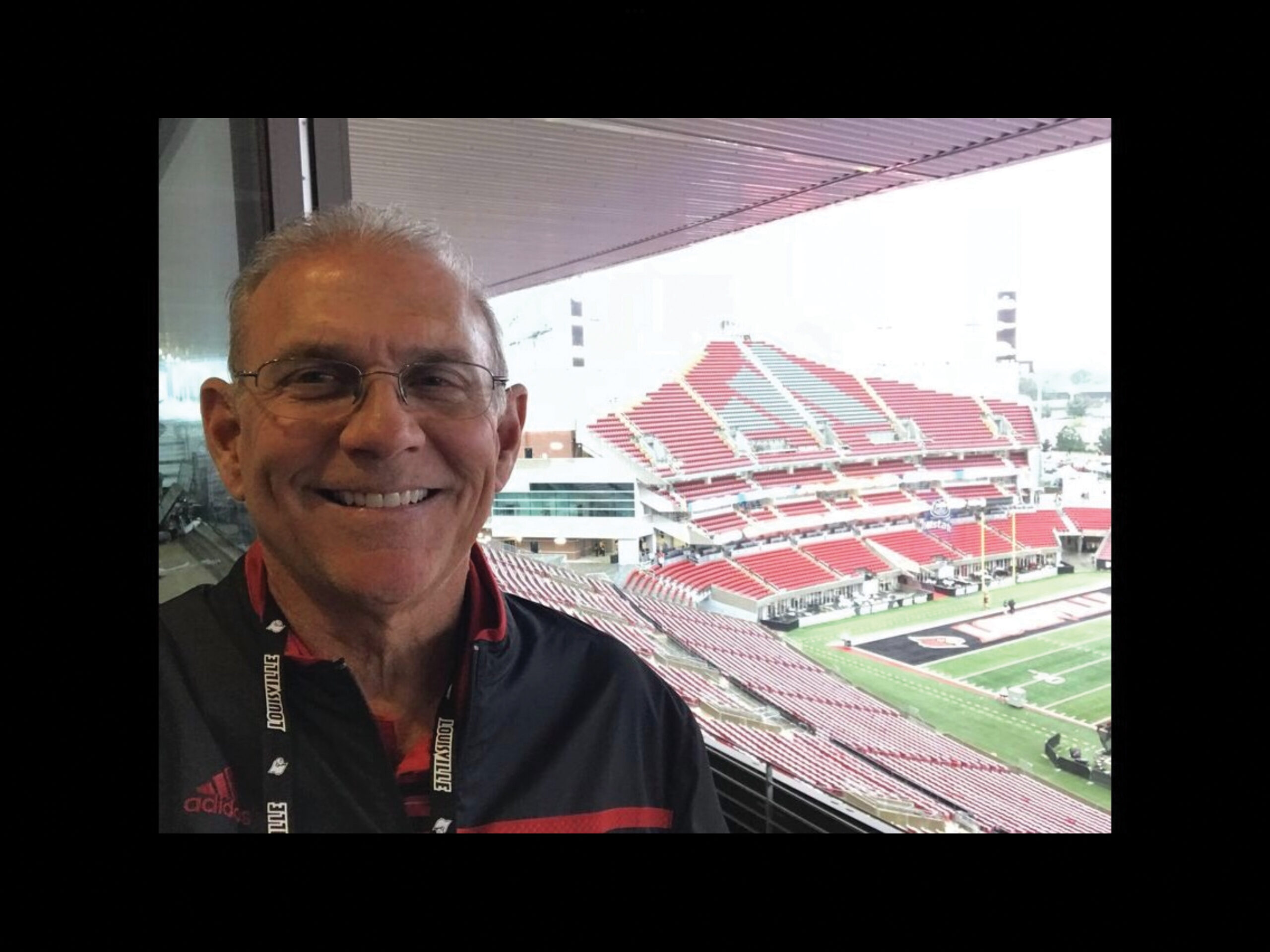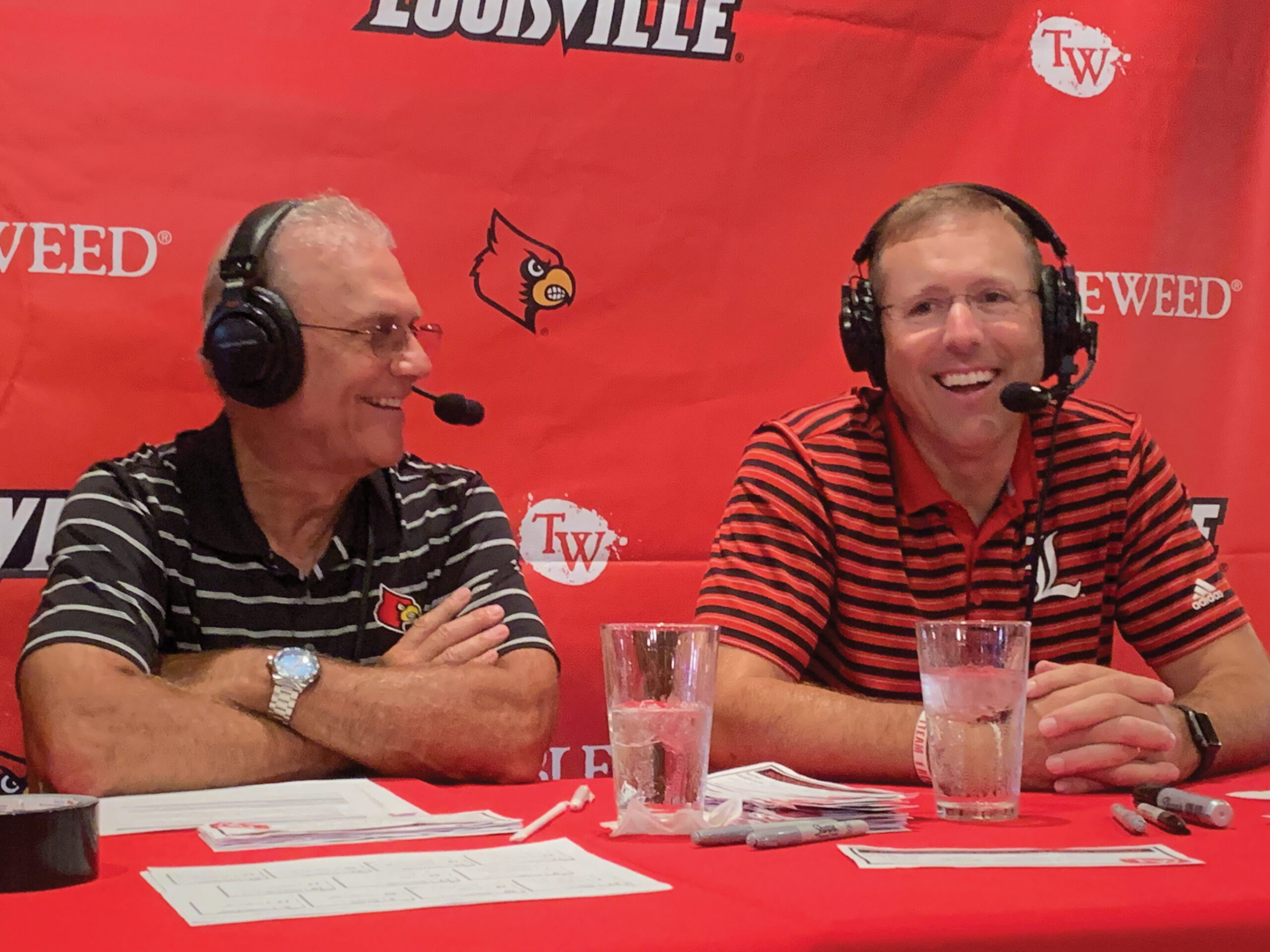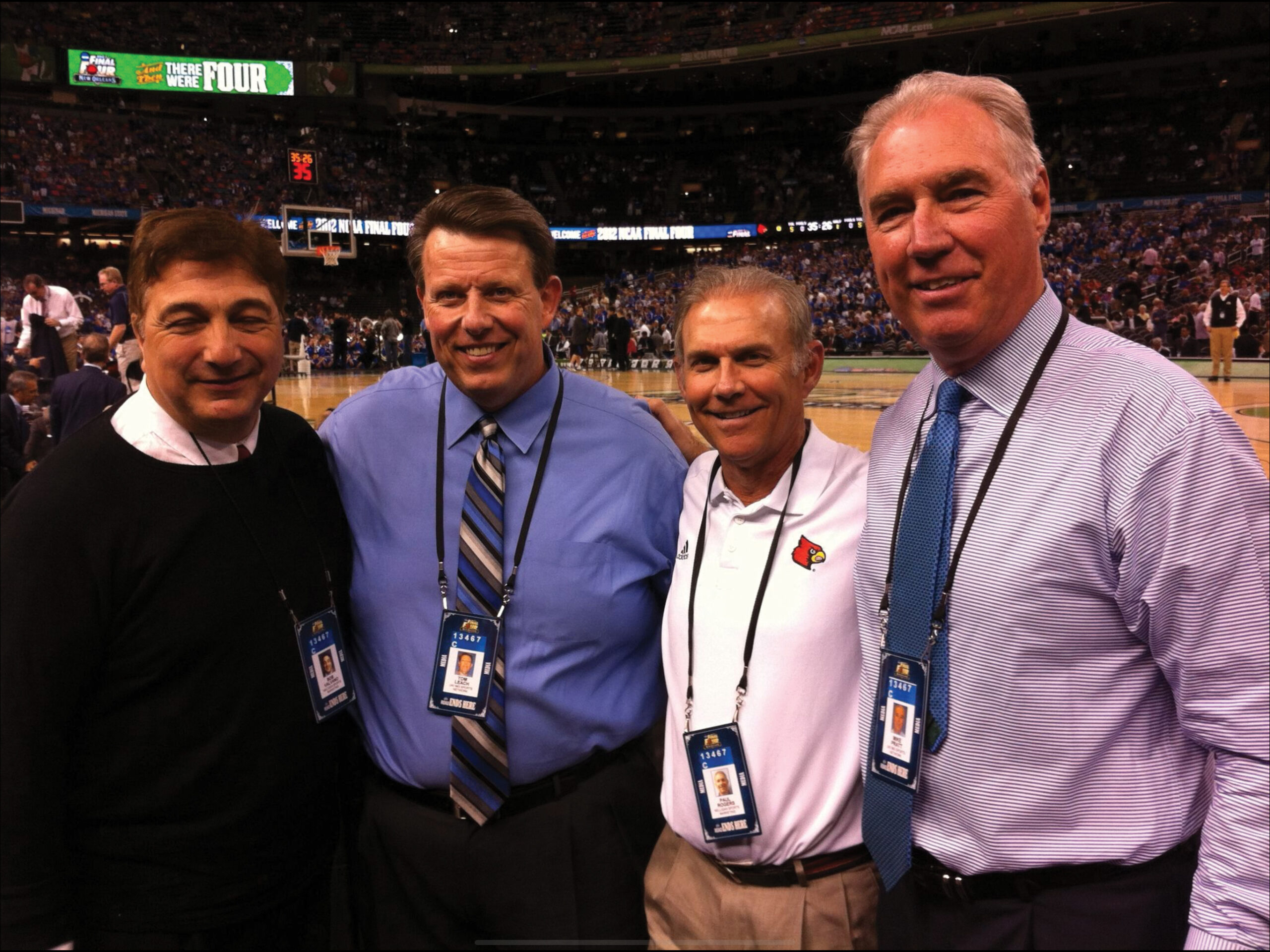 Mark Green: You guys made being the play-by-play announcer for our two major universities your goal at early ages and achieved it! Paul, you began in 1992 and Tom, you in 1997. Is it still fun?
Mark Green: You guys made being the play-by-play announcer for our two major universities your goal at early ages and achieved it! Paul, you began in 1992 and Tom, you in 1997. Is it still fun?
Paul Rogers: Very much so. Anybody who does this job as long as we have is having fun or we would have given up long ago. It has its challenges, its good years and bad years. The bottom line is I enjoy going to basketball games and football games, and I enjoy describing them.
Tom Leach: Same for me. The games, even the preparing for them, it’s just as fun as it always was. Paul and I are both nearing the age people think about retiring. There are things in my work life I would be glad to reduce or step away from, but games and preparing for them is not one of those. It’s fun to be there.
MG: What were the steps you took to achieve your goal?
PR: I wanted to do this as far back as junior high school. I enjoyed sports and enjoyed talking, and when I realized I wasn’t going to be good enough to be a professional athlete, I thought maybe I could talk about it. I began practicing speaking and went to the University of Kentucky, majoring in telecommunications. I was able to get good experience at the student radio station and got to know Cawood Ledford; not intimately but he knew who I was and what my goals were.
Just as I got out of college, WHAS (the Louisville based 50,000-watt AM radio station) decided to expand their sports department; they needed someone to do University of Louisville games on their FM station as well as some other things. I interviewed with Cawood and had a good meeting. He called me the next day and said, ‘You got the job.’ I was just about turning cartwheels through the house!
TL: A teacher started a closed-circuit newscast at our Bourbon County Junior High and I thought that would be a cool thing to be a part of. I got to do a sports report on the daily student newscast and started thinking I wanted to get onto this path. I grew up listening to Cawood and Ralph Hacker on the Kentucky games and Al Michaels and Marty Brennaman and Joe Nuxhall on the Cincinnati Reds games, so I was blessed by who I grew up listening to. When I was 16, I got a job at my local radio station working on the high school football broadcast, keeping stats and getting to go on the air and do a report. By the second year I was getting to do some play-by-play.
I did that through college then got a full-time job. I was a DJ and news person, but I got to do play-by-play about 40 games in the season and that helped hone some skills. Just doing games has never paid enough to pay the bills. When you’re trying to break in, you’re just trying to get on the right team where you can try to get to the next job.
I started working in 1977 then in 1984 went to the UK flagship station, which was WVLK, and got to work on the UK network in 1989 doing some post-game things, scoreboard shows etc. I got a chance to do football in 1997 and basketball four years later.
I did not appreciate how narrow my target was, aiming at being the play-by-play guy for one particular school. There aren’t an abundance of play-by-play jobs anyway, and to target one particular school was a pretty narrow target. The smartest thing I did was, I thought if I got on the flagship station, WVLK, I was “on the team” or close to it, working with the people who are on the team. Ralph Hacker was the biggest influence for me in terms of becoming a better broadcaster and being a champion for me when the time came for him to step down.
MG: Game broadcasting requires energy and emotion and focus because your audience is fans who care about the team. How do you maintain that?
PR: It comes about naturally. There’s a festive atmosphere, some games more than others depending on what’s at stake. I truly enjoy the games and the excitement. Even in a 3-20 season (UofL’s basketball record at the time of this interview), I’ve gotten excited this year. When you get totally immersed in the game, it doesn’t matter how good or bad your team is, you want them to win, and that’s exciting to be part of.
ML: I’m exactly the same way. I did some (high school basketball state tournament) Sweet 16 games and you might have no connection to either school, but if it’s an exciting game, being a fan naturally comes out in the broadcast. You are excited to be there, just like the people watching it. It doesn’t have to be the team that you root for. It’s just that you enjoy the games.
 MG: Fans get upset with bad plays and calls. What about you? How do you handle that when you’re broadcasting a game?
MG: Fans get upset with bad plays and calls. What about you? How do you handle that when you’re broadcasting a game?
PR: It’s natural to show disappointment and sometimes a little aggravation, but I’ve always tried to not call out players. I don’t feel like that’s my role. They are college students playing a game for our entertainment. I’ll say, ‘He just threw a bad pass, he made a mistake,’ but I’m not going to say the guy did it on purpose or is ruining the game.
TL: I look at the play-by-play guy like the beat writer for the newspaper, where you’re reporting on what you see as opposed to the columnist who’s doing commentary. If he threw it over his head or made a bad decision, those are facts as opposed to any kind of ‘He just doesn’t care anymore, he’s quit or he doesn’t want it badly enough.’ You don’t know any of those things. You just stick with the facts that everybody ought to be able to agree on.
MG: Do you ever have to put a lid on the excitement?
PR: The thing I most liked about Cawood Ledford—and I try to emulate, although I have not done it as well—is he was not a screamer. He had this way of showing tenseness in the timbre of his voice. You could sense this excitement and tension without screaming. I never liked announcers who did; with a color guy screaming in the background, there’s so much confusion a listener has a hard time knowing what’s going on. While I convey excitement, and at times have gone a little above what I would like, I try to keep it under control so people listening can tell what’s happening.
ML: When I was first getting started, one of the teams I covered won the regional championship to go to the state tournament. If you listen to the broadcast, it’s hard to understand what’s happening. That’s bad if you’re not able to know what’s happening because that’s our job. You can use your voice as an instrument to convey excitement and not do anything that makes it harder for the listener to know what’s going on. You can say, ‘Wow, what a great play!’ But that doesn’t tell me what happened if I’m not there. Be excited but do the job you’re there for and just describe it. Then you are painting the full picture for the listener.
MG: How important is it to maintain that audience trust?
PR: You want to paint an accurate picture. Right now, University of Louisville basketball is in a rough spot. If you go along telling everybody how great things are, you have no credibility. On the other hand, you’re not going to dwell on how awful everything is. You pick up on the good things that happen, but the overall theme is this is not a good season. I lean toward being optimistic, but I’m realistic as well.
TL: It’s more fun when they win, but you have to be accurate and honest in what you’re seeing and describing. And that goes with the officiating; every call that goes against your team is not a bad call. You know this just like players and coaches do, and you try to be honest. A play happened in a recent game that looked like a bad call and you see the replay—which we have these days—and it turns out I was wrong.
That’s part of being honest, too.
MG: What kind of a challenge does a bad game or season present for keeping yourself engaged and the fans interested?
PR: If you’re getting blown out night after night, there’s nothing you can do to get the fans interested. But you’re there and you describe what you’re seeing. You never just complain all the way through a bad game; nobody wants to listen to that. You just describe the action; if it’s bad play, it’s bad play. You have to stay engaged; you can’t get up and leave. Fans can do that whenever they want.
TL: Once after a bad loss, a friend of mine said, ‘I used to think you had the best job in the world but last night I was able to turn it off and leave, and I realized you couldn’t.’ There are good days and bad days in every job. You do what you’re hired to do. We have great jobs. A lot of people would love to go to these games and have great seats. Nobody wants to hear you complain that it’s not as much fun today as usual. It’s still better than most other things. I enjoy it. And every time you go might be “the day”—even in a bad season, a great game or memorable moment happens.
MG: Do broadcasters ever have a bad game?
PR and TL: Oh, yes!
PR: I go back and listen to every game. I pick things I like and things I don’t like. We all make mistakes. I tell myself, ‘Why did you say that? You should have pointed this out or said it a different way.’
TL: It’s important to go back and listen to your work. Once in a while I’ll ask somebody else to listen in case I’m missing something. In basketball, the ball’s going to be shot into the basket a bunch of times, and you can fall into saying the same thing every time. It gets monotonous. It’s important to listen and find ways you can improve.
MG: When you started, not many games were on television. Now every game is. Has that changed how you approach radio broadcasting?
PR: When games were first starting to be televised, the radio broadcast would not acknowledge it was on TV. You didn’t want to chase off your audience. Now when virtually every game is televised, I’ve had the TV announcers on for pre-game interviews. I think people like to hear their perspective on things. We watch the replays ourselves from the monitor. You can see things on TV (replay) you can’t always see with the naked eye, so we use that to help our broadcast.
TL: There are always going to be people who for whatever reason can’t watch. And some folks listen to the radio broadcast because they like to hear that perspective from somebody who likes to see the team win like they do, whereas that’s not the case in the national broadcast. Some fans find a way to sync (our play-by-play) and more people would do it if there was an easier way.
 MG: You both have had the announcers positions for longer than any coach has been with the team. How do you approach having a professional relationship with coaches and players?
MG: You both have had the announcers positions for longer than any coach has been with the team. How do you approach having a professional relationship with coaches and players?
PR: It’s different with different coaches. I’ve always tried to maintain a very professional relationship and left the door open to that coach as to how he wants to make it. Denny Crum was such a normal person. I went to his house and played cards, did things like that. Things are not that informal anymore. I’ve had very friendly working relationships with the coaches, but it’s not like we go out to dinner, hang out together. You need to keep a little separation.
TL: The coach understands we have jobs to do if the team’s playing poorly that night. Everything’s professional. You develop a trust from the coaches and players you’re working with. Everybody’s just doing their job and you don’t have any agenda, you’re not trying to ambush them. Hopefully they get to a point where they trust you. As an example, if there’s an injury, the coaches may not want to talk about it to disclose any competitive advantage. By the time you get 20 minutes before tip-off or kick-off and there’s no time to make major changes in a game plan, if you have trust with the coach, then in the pre-game interview he or she may tell you so-and-so is not playing today. You are able to give that information to your audience and don’t have to wait until the game starts to see they’re not playing. You get access to practice; it’s not like either of us understand as much as coaches do, but you understand what they may want to emphasize in a given game and you can share with the audience. You want to have that relationship so you can get information and access that helps you be a better storyteller to your audience.
PR: In football, our pregame interview is actually Friday afternoon before the Saturday game. If the coach knows a guy is not going to play, he will go ahead and say it, assuming I will hold it until the pregame broadcast.
TL: I have the same kind of deals with coaches. I might ask an especially sensitive thing like, “What quarterback is going to start today?’ We understand this won’t air until 20 minutes before kickoff.
MG: In addition to play-by-play, Tom, you have a radio show, podcast, website and speaking engagements, and Paul, you have other regular sports duties. Do team or conference intellectual property contracts come into play for that?
PR: Any Louisville game broadcast is the property of Learfield, a company based out of Jefferson City, Missouri; they own the rights to about 90% of the universities around the country. I am free to do other things. For years I worked for WHAS radio and that was totally separate. I do go to the station here in town that airs the games on Monday morning to talk about the game and the week coming up and I do a Friday afternoon thing on the local ESPN station that’s on our own. The games themselves are completely the controlled property of Learfield.
TL: Kentucky is partnered with JMI Sports (for broadcast rights) with the same kind of parameters Paul has with Learfield. Where mine differs is my daily radio show is a deal where I purchase the time on the radio station to put a program on and then I sell the advertising. I own that show. I don’t work for the radio station. That’s my baby because I purchase the time every day. I have 100% control over who’s on or if I’m not hosting, who is; those things. I have a lot more control over something like that but not over the game because somebody has paid for the rights to broadcast those. Anything you put out there on social media or a radio show, you’re ultimately accountable for it.
MG: What is the biggest game you called?
PR: For me it would have to be the (2013 basketball) national championship game. Every time I think of that game, I think of all the great games that got them there. In the Big East (Conference) championship game against Syracuse they had a huge comeback, the game (in which) they bounced back after Kevin Ware got hurt in the regional final against Duke. In football, it would be the (2007) Orange Bowl certainly and the (2013) Sugar Bowl.
TL: For me it would be the 2012 national championship the basketball team won in New Orleans. You love those last-second finishes; you don’t get a lot of those and your team doesn’t always win. In 2014 Kentucky won four consecutive games in the NCAA tournament where the outcome was in doubt in the final shot. That was thrilling. In football, the Citrus Bowl win after the 2018 season where Kentucky won 10 games for the first time since 1977 was a cool moment. That hadn’t happened since the ’50s, and Benny Snell set a school career rushing record in that game. When coach Rich Brooks was here, they beat the No. 1 team in the country in triple overtime—that was another memorable one.
MG: Sports is big business. NIL (name/image/likeness) deals involve money and financial considerations can impact transfer portal activity. How do finances affect the teams, coaches and players?
PR: Those things have all had a great effect because you can reshape and completely redo your team from year to year. With high-stakes money, there are a lot of things involved that aren’t what we all thought we were getting into with amateur athletics. But no matter what goes on, no matter how aggravated I get with it, to me it doesn’t affect the game itself. The broadcast, the competition, the game, the excitement, all that falls in the background when guys are playing the game. Hopefully it will remain that way. We haven’t seen a player yet say, ‘I’m out, I’m quitting because I’m not getting my money.’ That stuff goes on peripherally, but I don’t see it affecting basketball or football when the game is being played.
TL: I feel the same. It is a big business; the way all that’s handled will continue to evolve. But as long as there are still games being played, we’ll be there to describe what’s happening. They’ll still have five guys out there in basketball, 11 in football. How they get to that point is certainly changing.
 MG: Is the role major college sports and your broadcasts play in creating bonds statewide a consideration or do you just stay focused on what’s happening on the court and playing field?
MG: Is the role major college sports and your broadcasts play in creating bonds statewide a consideration or do you just stay focused on what’s happening on the court and playing field?
PR: We’re focused on what we’re seeing and saying, but we would be ignorant to ignore how meaningful it is to this state, particularly in Tom’s case with UK truly a border-to-border team. Louisville has a very active fan base within Jefferson County but outside the county it’s only sprinkled amongst the Kentucky fans who blanket the state. It’s a big part of people’s lives. A great example is hearing how miserable a lot of people are at the bad basketball season Louisville is having. They’re sad or upset, almost to an unhealthy level. Not everybody obviously, but for some people it affects their whole demeanor. You love the passion, but you like people to be a little more realistic about life, too. I enjoy sports—it is my livelihood—but it’s more for enjoyment and entertainment.
TL: I agree. What we’re doing is not curing a disease, but hopefully it is making somebody’s life better. Even if they’re frustrated at how their team is doing, they still enjoy being engaged with other fans. Hopefully while we are doing something we really enjoy, we’re serving some kind of purpose too.
It affects the economy too. Not as many people go out to eat or to watch a game or stay in hotels and all those things if the seasons aren’t going well. Fans are heavily invested. They care a lot and that’s good.



















